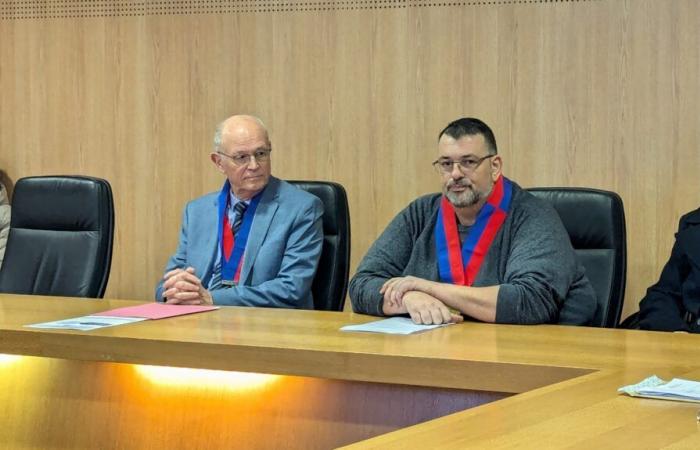The solemn return of the industrial tribunal of Deux-Sèvres took place this Monday, January 20, 2025 within the walls of the commercial court, rue Marcel-Paul in Niort (1). On this occasion, and as in 2022, Jean-François Cachet, of the employer college (seventeen years of mandate), re-entrusted the sash of the presidency to his counterpart of the employee colleague, Michaël Guichard (eight years of mandate).
While the council ended the year 2024 with a number of 371 files, including 47% new, the court observed that the number of “incoming” cases had continued to decrease: the advisers see this as a direct effect of the entry into force of the visibly dissuasive “Macron scale”, this calibration of the minimum and maximum amounts of compensation to which an employee can claim for damages.
Jean-François Cachet notes that the introduction of this scale has triggered, in parallel with the increasingly frequent invocation of serious misconduct by employers, “a change of approach on the part of litigious employees” who, since 2023, have increasingly attacked their employer in the area of harassment, mainly moral and especially in large companies, with cases of employees saying they are pushed to the limit towards resignation.
“Difficult to prove”
Michaël Guichard confirms that the jurisdiction “witnesses more and more what we call “taking of acts” [le salarié démissionne en affirmant que c’est la faute de son entreprise] or “judicial terminations” [le salarié est encore en poste mais dénonce son entreprise] ».
According to Mr. Cachet, harassment cases represent between 20 and 30% of procedures. Most of the cases were insufficiently supported to bear fruit. “It is also a way found by lawyers to circumvent the Macron scales”underlines Michaël Guichard, noting that this strategy, currently growing on the employee side, was already regularly implemented in the Management section where harassment is invoked in 40 to 50% of cases.
-Symptoms of a dangerous tension in relationships within companies?
“Be that as it may, harassment remains very difficult to prove”puts Mr. Cachet into perspective who notes a success rate of barely 10%. “If the lawyer does not provide solid evidence, we can only start at the beginning. »
(1) Until now installed in premises that have become too small on rue de la Préfecture, the industrial tribunal is currently taking up new quarters in a completely rehabilitated building on rue de l'Hôtel-de-Ville called ” Eunomia.” Its now vice-president Jean-François Cachet sees in the integration of the industrial tribunal council within this new pole “a reminder that industrial tribunal councilors are judges in their own right”.






